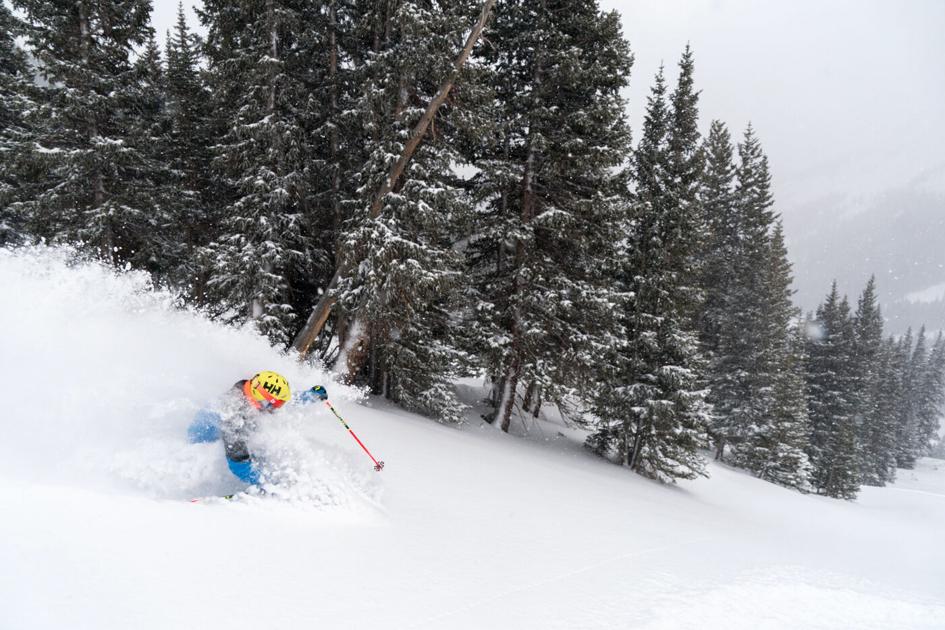It’s Presidents Day weekend and, in a normal year, lift lines at ski resorts across the state would be jam-packed with skiers and snowboarders.
Many would be crowded indoors warming up with a cup of hot chocolate or getting an early start on a night on the town with an ice cold brew.
But while heavy snowfall is expected for much of the mountains this weekend, most ski resorts say they are expecting less traffic than normal and cite COVID-19 and capacity restrictions for the decline.
They do not, however, expect a rash of avalanche advisories to have much impact. Officials say that the people coming are aware of the danger and are unlikely to take risks.
“We expect to be not as busy as a traditional Presidents weekend, but I think things do seem to be picking up a little bit,” said Jeff Hanle, the director of public relations at Aspen Skiing Company.
Still a few resorts, including Telluride Ski Resort, are optimistic about this weekend’s turnout and don’t believe the numbers will be affected that much, said Nancy Clark, the vice president of marketing.
“We’ve been fortunate to get a lot of snow in the last couple of weeks, so our numbers are looking really strong and skiing is really good right now,” Clark said.
But Telluride appears to be an outlier. Other resorts that spoke to The Denver Gazette on Friday are expecting fewer visitors than normal in what is traditionally one of the busiest skiing weekends of the year.
At Aspen and Winter Park, officials said the lack of indoor dining options due to restrictions have also kept skiers from hitting the slopes.
“We don’t have any indoor dining at the resort and haven’t for the whole season,” said Jen Miller, a spokeswoman for Winter Park Ski Resort.
“There’s also very limited space for people to go inside and warm up even, so we’ve had to encourage people to go to their cars, or to their condos to eat and warm up, because we just don’t have the facilities on the mountain right now.”
But Hanle says he is hopeful that Pitkin County will soon move from Level Orange on the state’s COVID-19 dial to Level Yellow, which will increase capacity at restaurants and indoor venues.
Another threat to ski resorts across the Rockies are COVID-19 outbreaks. Recently several resorts including Winter Park, Breckenridge and Keystone, have reported spikes.
Winter Park has the largest outbreak with 6.4% of its 1,700 employees currently battling COVID-19. Despite the outbreak, Miller says it’s other factors that are driving folks away, including the weather.
“With the exception of last weekend we have not had as much snow as we normally do,” said Miller. “Mother Nature has really impacted operations on the mountain.”
While COVID-19 hurts a lot, ski officials discounted any suggestion that visitors might be scared away by the “once-in-a-decade” dangerous avalanche conditions that have put much of the state’s mountainous areas under an avalanche watch and promoted Gov. Jared Polis to issue a warning in a news release.
In Thursday’s release, Polis urged Coloradans and travelers headed to the backcountry to be aware of the avalanche conditions and limit travel.
“As we head into the Presidents Day weekend with Coloradans heading to our mountains, everyone must be prepared to take extra precautions and check the avalanche forecast, particularly if your plans include traveling into Colorado’s backcountry,” Polis said.
“We haven’t seen it this bad since 2012,” Colorado Avalanche Information Center (CAIC) Director Ethan Greene added in a PSA posted on YouTube Friday.
“We see these conditions about once every 10 years, so if you’ve been recreating in the winter for 20 years, this may be the second time you’ve seen these conditions.”
But Aspen’s Hanle says those coming to Aspen and other resorts know the risk and know how to take precautions.
“We don’t get a lot of tourists coming to Aspen (that) go off into the backcountry where the avalanche danger is severe, so that’s generally not going to impact our business levels over a holiday weekend,” Hanle said.
And although the number of skiers and snowboarders is down for now, Hanle is optimistic about the longer term future as more people get vaccinated and traveling resumes.
“It’s still slower than normal for certain, but we’ve been a little busier than January was and we’re optimistic numbers will continue to go up,” Hanle said.
This content was originally published here.
